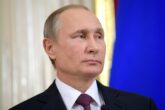October 05, 2022
The Energy Crisis Could Fragment the European Union
In her State of the Union address on Sept. 14, European Commission President Ursula von der Leyen emphasized European Union unity in response to Russia’s war in Ukraine, noting that the “Union as a whole has risen to the occasion.” This statement largely rings true. The EU’s severe sanctions on Russian central bank assets, oligarchs, and its commercial banking sector, along with measures such as military assistance to Ukraine and protection for its refugees, demonstrate an impressive willingness to act together in a crisis. As the war passes the seven-month mark, however, fractures in European solidarity are deepening, driven largely by turmoil in the energy sector.
A bleak winter looms for the European Union. As temperatures drop, demand for natural gas will surge, putting pressure on the bloc’s increasingly constrained supplies in the wake of Russia’s cutoffs of exports through and apparent sabotage of key pipelines such as Nord Stream 1. Already, citizens are struggling to deal with dramatic rises in energy costs — residential consumers in Spain, for example, have paid 140 percent more for natural gas, while German and French electricity prices had increased by more than tenfold over the previous year as of late August.
As European leaders face the daunting task of managing the energy crisis during the winter ahead, it will take adept political compromise to maintain the morale of citizens and their support for Ukraine in its war with Russia.
This energy crunch is causing quarrels among member states. Germany, Spain and Portugal are currently at odds with France over the completion of the MidCat pipeline, which could alleviate Central Europe’s gas supply constraints by linking it with the Iberian Peninsula. French President Emmanuel Macron adamantly opposes the project, arguing that the pipeline is unnecessary and clashes with the bloc’s energy transition goals. However, this opposition likely stems instead from a desire to block competition for French energy exports — an unpromising sign for EU solidarity.
Read the full article from The Hill.
More from CNAS
-
The Eurasian Century: Hot Wars, Cold Wars, and the Making of the Modern World with Hal Brands
For more than 100 years, the continent of Eurasia has played a central role in global geopolitics. In the 20th century, numerous authoritarian powers from Germany under Kaiser...
By Andrea Kendall-Taylor, Jim Townsend & Hal Brands
-
Trump Wants a Nuclear Deal. Can He Be the Ultimate Negotiator?
Should Trump negotiate with Russia’s Putin, and what terms should he pursue if US and global security is to be enhanced?...
By Jon B. Wolfsthal
-
Trump Turning Washington Crash into ‘Bar Room Talk’ Will Turn People Away | Jim Townsend
Trump's unchecked claims that the DC crash was caused by diversity quotas should "turn people away" from him, says Jim Townsend, an adjunct senior fellow in the CNAS Transatla...
By Jim Townsend
-
Putin’s Fight Won’t End With Ukraine
In an essay for Foreign Affairs, titled “Putin’s Point of No Return,” Andrea Kendall-Taylor, senior fellow and director of the Transatlantic Security Program at the Center for...
By Andrea Kendall-Taylor




